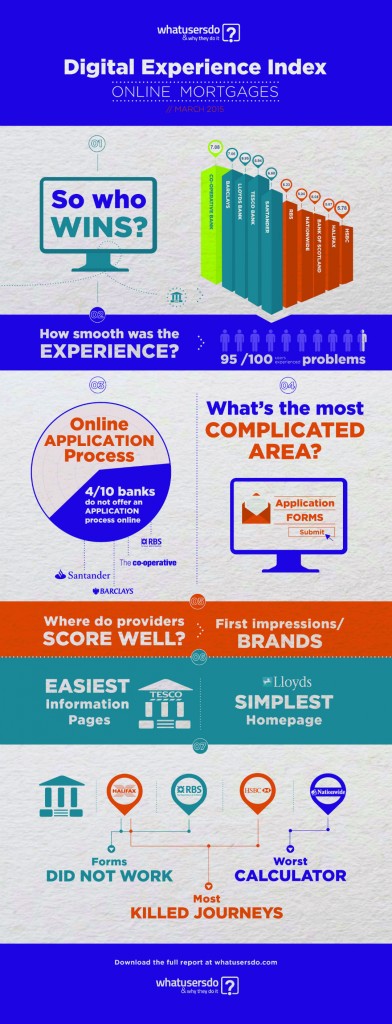Using online services is quicker, more convenient and relatively hassle-free in most cases but is that true for mortgage applications? Vanya Damyanova reports
The first thing many people do when looking for something is to go online and browse the internet. Almost any product or service now is just a convenient search string away. By going online customers immediately multiply the number of available choices. And after the choice has been made, obtaining the selected product usually takes just a few mouse clicks.
Retail was the first to draw a large number of consumers to the web but this has quickly expanded to other related sectors and today most people expect to have an online option for every service provided offline.
Financial services is no exception. Research from Fujitsu earlier this year showed online banking to be the most used digital service (by 67%) in the UK. The latest trend is mobile banking, which according to the British Bankers Association (BBA) has overtaken both branches and the internet as the most preferred way for people to handle their finances.
The BBA’s CEO Anthony Browne commented: “Technology is changing our lives and banking is no different – it is now easier than ever for us to check our balances, pay our friends and manage our money. The rapid take up of apps and mobile banking appears to be a real game changer for the British public.”
The trend is clearly towards doing more online than offline and there is data suggesting the number of customers applying for a mortgage online will jump soon. Recent research from HBSC found that the proportion of online mortgage applications is likely to more than double to 33% in 2015 from 16% last year.
Online user experience
While this may be the case, a number of consumers are bound to be disappointed with what lenders currently have to offer, as online user experience (UX) testing service WhatUsersDo has discovered. In March 2015, the online service put ten of the biggest UK banks to the test, using a diverse group of 100 customers. The results suggest lenders need to do a great deal more in the future to improve the online application process.
More than half of participating testers were not able to make sense of the stated mortgage rates and they found online applications difficult to understand.
Just 5% of participants did not encounter any issues while applying online. The remaining 95% experienced a wide range of issues varying from mild nuisances to deal breakers. Almost nine in ten (87%) of test customers were faced with at least one serious problem during the online application process.
The average result for the tested lender websites, including Bank of Scotland, Barclays, Halifax, HSBC, Lloyds Bank, Nationwide, Royal Bank of Scotland, Santander, Tesco Bank and The Co-operative Bank, was 6.46 out of 10.
The Co-Operative Bank scored highest at 7.08, followed closely by Barclays with 7.06, which according to the WhatUsersDo marking system meant that test-customers “were able to use the page with no problems and no positive highlights.” Lloyds Bank was third with a score of 6.95.
The research also revealed that all customers who were able to complete their online applications without stress had previous knowledge of mortgages, while none of the first-time buyers taking part in the tests had a smooth online application journey.
But remember, this survey only consisted of 100 people and from the experience of the first-time buyers in our case study above, it was all positive.
Nevertheless, the experience of many of the survey respondents highlights the importance of being well prepared before going online to apply. Savvy first-time buyers can save themselves a great deal of time and complications if they make sure all of their financial affairs are in order before contacting a lender.
Be prepared
So what can you do to improve your chances to have a good experience when applying online?
1. Check your credit score
Poor credit history might be a reason for your lender to decline an application, so it’s best to check what your situation is beforehand. Credit reports can be reviewed on the websites of credit reference agencies such as Experian and Equifax, which are free for the first 30 days and Callcredit whose service is free even after 30 days.
2. Work out a budget
Do the maths before applying because this way it will be easier for you to choose the mortgage that best suits your means. You need to make sure you can borrow enough to buy the home you want and that you have enough money left for fees, charges and additional costs related to taking out a mortgage and moving home. The size of your monthly mortgage repayments will be determined by the amount you have borrowed, the term of your loan (the typical mortgage term in the UK is 25 years) and the interest rate charged.
3. Have all necessary paperwork ready
This is what the Money Advice Service recommends you to have handy before starting your application:
- Your last three months’ payslips
- P60 form from your employer
- Bank statements of your current account for the last three to six months
- Statements from your savings accounts
- Proof of benefits received
- Statement of two to three years’ accounts from an accountant if self-employed
- Tax return form SA302 if you have earnings from more than one source or are self-employed
- Self-employed people should look to provide information alongside their tax return, which supports what the SA302 says about their income, such as bank statements
- Utility bills
- Passport or driving licence (to prove your identity)
4. Clear as much of your debt as possible
It will be best to get rid of all outstanding debts you have before starting your application. A large amount of other debt could prompt your lender to reconsider approving a mortgage. The higher the debt, the bigger the risk you may miss a repayment in the future. With the stricter affordability rules, lenders must ensure you will be able to pay back the loan before they grant you a mortgage.
5. Get advice
If you still want to apply for a mortgage online you could also consult an independent adviser before choosing what mortgage you would like to apply as a professional is likely to know all good deals currently on the market. Remember, even if you have purchased a property before, your experience is limited, while professionals see hundreds of deals every year.
After you have done all this, you will have a better idea what you can afford and what deal will best work for you given your savings, debts, individual property preferences.
Approval in principle
You can now also run a quick affordability check with your lender. This is called approval in principle (AIP), which is basically a conditional agreement from the lender that they will loan you the money you are applying for. The AIPs should take around 15 minutes and you can run one online.
Yorkshire Building Society and Halifax both launched new tools for mortgage eligibility checks in August this year. There is no requirement to provide information such as property details or deposit amount, so you are able to run a check like that before choosing a specific mortgage deal.
[box style=”2″]
Case study: Young couple find online application quick and easy

Richard Baker and his partner Helen Day-Cocking are both 23 and internet savvy so when it came to applying for a mortgage, their first port of call was to go online.
They have bought a three-bedroom bungalow in Gunnislake, Cornwall. Richard is originally from London but the couple moved to the village Helen grew up in two years ago. They both work fairly locally, Richard at a dry ski slope in Plymouth and Helen is in business development within the education sector.
So why did they decide to apply for a mortgage online rather than go to a broker or visit a bank or building society?
Richard says: “We didn’t want to sit in multiple meetings at a bank and going online was the easiest way to compare multiple companies in one place. We looked at different company websites and found a really good deal with Virgin Money that suited us. It’s a five-year fix at 2.75 per cent with £999 fee but it came with a £300 cash back.”
The couple had done their homework and had an idea of the type of mortgage product they wanted.
Richard explains: “We knew we wanted to fix for a fairly long time and liked the idea of knowing what the monthly costs would be. But we didn’t want the commitment of anything longer, like a 10-year fix, as a lot can happen in that time.”
As for the process of applying online, Richard said it was very easy and straightforward. Virgin Money emailed over an application form for Richard and Helen to print out and fill in, but it was already partly completed from the details they had previously given online.
It was a fairly quick process although there was a stumbling block trying to find certain documentation surrounding previous address history, as having been students they had moved around a bit.
But they were very happy with the smooth progress of the mortgage application from start to finish: “We had access to the same underwriter who was working on our mortgage. We only had to ring Virgin Money a couple of times about forms of ID but they were very quick in getting back to us and always helpful.”
[/box]





